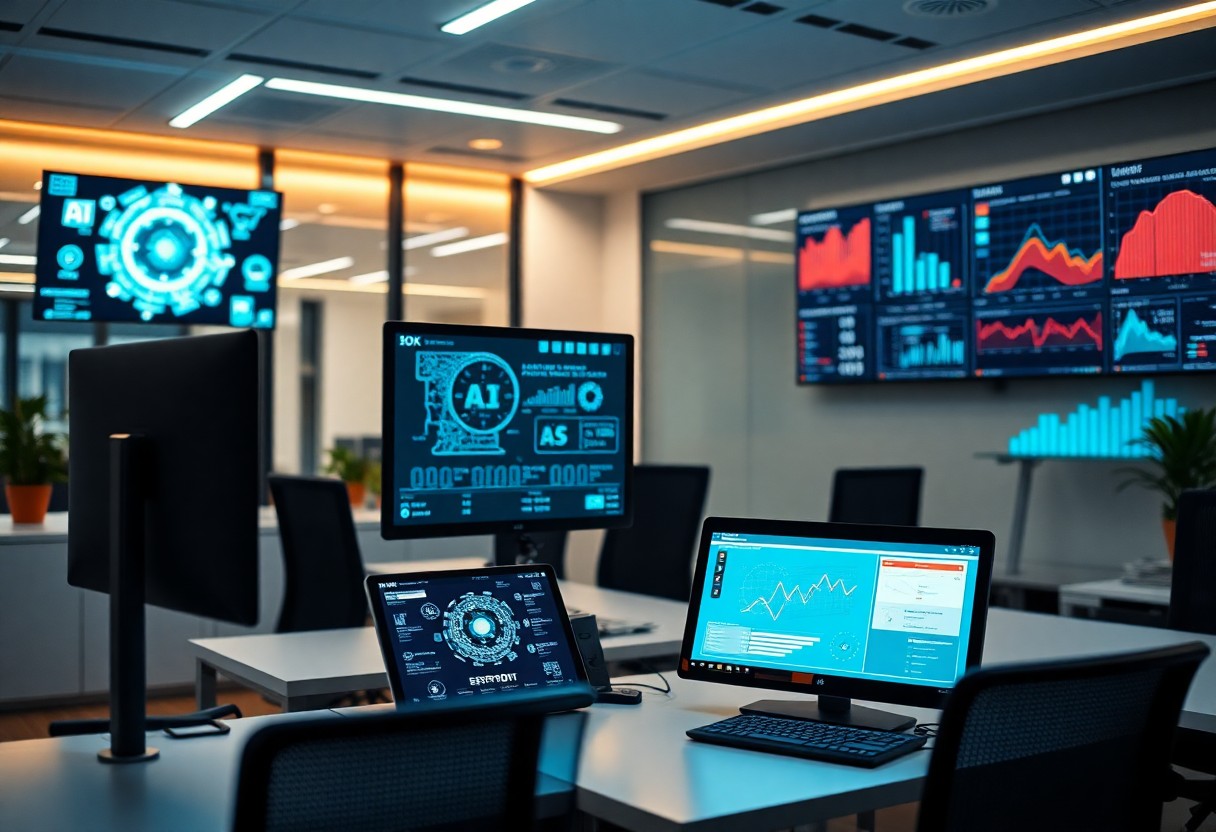You may be wondering how the emergence of artificial intelligence and platforms like NewZenler are reshaping the landscape of Learning Management Systems (LMS). As technology rapidly evolves, it’s important to assess whether your current LMS can meet the challenges and opportunities presented by these advancements. This blog post will guide you through key considerations, ensuring your LMS remains effective and aligned with modern educational needs.
Decoding the Role of AI in Modern Learning Environments
The Intersection of AI and Learning Management Systems
Your Learning Management System (LMS) can significantly enhance its capabilities through the integration of AI. This evolution allows for personalized learning paths, improved engagement, and more efficient administrative processes. AI algorithms analyze student data, helping to tailor the educational experience to individual needs, resulting in faster skill acquisition and better retention rates. With platforms like NewZenler, AI-driven insights can facilitate just-in-time interventions, ensuring that learners receive support before they encounter obstacles.
Benefits and Challenges of AI Integration
AI integration in your LMS offers transformative advantages, yet it comes with complexities that warrant attention. On one hand, you gain adaptive learning experiences and data-driven insights that fine-tune your educational strategies. On the other hand, the implementation of AI may require significant upfront investment, training, and ongoing adjustments to maintain its effectiveness.
Investing in AI for your LMS can yield numerous benefits—adaptive learning systems cater to diverse learning styles, while automated administrative tasks free up valuable time for educators. Over time, students experience enhanced learning outcomes due to targeted interventions. However, challenges persist, including the potential for biases in algorithms and the need for rigorous data privacy measures. Navigating these complexities involves ongoing evaluation and adjustments, ensuring that your AI systems remain effective and equitable while maximizing the learning experience.

Zenler: A Game Changer in the LMS Landscape
Features that Set NewZenler Apart
NewZenler introduces a plethora of features designed to enhance the learning experience. Notable functionalities include a built-in marketing suite, customizable course builder, and seamless integration with various payment gateways. You can easily engage your learners through an intuitive UI and create personalized learning paths, all while tracking performance analytics in real-time. This all-in-one platform is aimed at simplifying processes, making it easier for you to focus on teaching rather than technology management.
The Impact of NewZenler on Course Creation and Delivery
NewZenler revolutionizes how courses are created and delivered by streamlining the entire process. With its drag-and-drop course builder, you can quickly assemble lesson content, quizzes, and multimedia elements to engage your audience. The platform supports various learning formats, allowing you to mix live sessions, pre-recorded videos, and interactive elements seamlessly. This level of versatility not only enhances your teaching arsenal but also caters to diverse learning preferences among students.
Moreover, NewZenler’s automated marketing tools allow you to promote your courses effectively. With email marketing features and landing page designs at your disposal, you can reach your target audience with ease. The analytical insights provided help in refining your course material based on learner feedback and success rates, enabling you to continuously improve your offerings. By optimizing course delivery and engagement, NewZenler helps you maximize learning outcomes, ensuring students receive the quality education they deserve.

Charting the Preparedness of Your LMS
Key Indicators of Readiness
Evaluating your LMS’s preparedness for the integration of AI and NewZenler can be straightforward. Look for features such as personalized learning pathways, automated administrative tasks, and analytical reporting capabilities. An LMS that supports integration with third-party AI tools and offers real-time feedback on learner performance demonstrates a readiness to adapt to new technologies. If your system includes user-friendly dashboards that allow for customization and learner engagement insights, it likely possesses a solid foundation for leveraging AI.
Common Pitfalls in LMS Adaptation
Adapting your LMS to embrace AI and NewZenler may uncover several barriers that hinder progress. One prevalent issue is insufficient user training, leading to a lack of comfort and confidence among staff and learners. Additionally, outdated technology may slow down implementation, resulting in missed opportunities for innovation. Organizations often overlook the need for comprehensive data integration, leading to fragmented insights that can limit the effectiveness of AI-driven features.
Mistakes in LMS adaptation often stem from a top-down approach where decision-makers implement changes without consulting the end-users. Failing to account for learner feedback can result in technology that doesn’t meet actual needs, creating frustration rather than enhancing the learning experience. Ensuring that your implementation strategy involves input from educators and learners can fortify the investment you make in AI capabilities, allowing your LMS to evolve in alignment with user expectations and learning goals.
The Revolution of Personalized Learning Through AI
Understanding Adaptive Learning Technologies
Adaptive learning technologies are at the forefront of educational innovation, utilizing AI algorithms to personalize the learning experience. By analyzing data from learners’ interactions, these systems adjust content and pedagogical approaches according to individual progress and preferences, creating a more tailored experience. For example, platforms like NewZenler can recommend specific learning paths based on your strengths and weaknesses, helping you achieve mastery at your own pace.
Transformative Outcomes for Learners and Instructors
The integration of AI in learning management systems like NewZenler fosters a dynamic environment where both learners and instructors experience unprecedented benefits. Personalized learner experiences reduce frustration and increase engagement, while instructors gain valuable insights from analytics, allowing for more informed instructional strategies. This shift leads to improved retention rates and a more adaptive teaching environment that meets the unique needs of each learner.
Consider the impact on learning outcomes: studies show that personalized learning can boost student performance by as much as 30%. Instructors benefit from real-time feedback on student progress, empowering them to make timely adjustments in their teaching methods. Instead of a one-size-fits-all approach, AI-driven learning systems enable you to focus on individual growth, enriching the educational journey for both parties involved. With NewZenler’s capabilities, the boundaries of traditional instruction are redefined, facilitating an interactive and responsive learning atmosphere conducive to success.
The Future of Engagement: AI-Driven Analytics
Predictive Analytics and Learner Insights
Integrating predictive analytics into your LMS allows you to anticipate learner behavior and outcomes more accurately. By analyzing historical data, your system can identify trends and patterns, enabling you to tailor courses and resources to meet the specific needs of your learners. This foresight not only enhances engagement but also helps improve retention rates and overall learning success.
Enhancing User Experience with Data
Data-rich insights empower you to create a more tailored and compelling user experience. By analyzing engagement metrics such as course completion rates, participation levels, and user feedback, you can refine content delivery and structure to better align with your learners’ preferences. Personalized dashboards that highlight individual progress and recommended resources can further encourage active involvement, making the learning journey more engaging and effective.
Utilizing data to enhance user experience means continually adapting your LMS environment to suit the evolving needs of your learners. By implementing features like adaptive content recommendations and gamification elements based on user interactions, you foster a more personalized atmosphere that resonates with varied learning styles. For instance, if data reveals a high dropout rate in a particular module, you can adjust content delivery or provide targeted interventions, thus elevating the overall learner experience and maximizing satisfaction.
Bridging the Gap: Integrating NewZenler with Existing Systems
Strategies for Smooth Integration
Your approach to integrating NewZenler with existing systems should prioritize compatibility and user experience. Start by conducting a thorough assessment of your current infrastructure to identify areas of compatibility. Consider establishing APIs to facilitate communication between systems and allow for seamless data transfers. Encourage collaboration between your IT team and LMS administrators to ensure technical requirements are met, while providing training sessions to get everyone on the same page regarding the new functionalities NewZenler offers.
Minimizing Disruption During Transition
Effectively managing the transition to NewZenler is imperative for maintaining productivity and engagement. Begin by implementing a phased rollout strategy where departments can gradually adopt NewZenler rather than deploying it organization-wide all at once. Collaborate with key stakeholders to create a pilot program that tests the integration on a smaller scale, allowing you to collect feedback and make adjustments without affecting the entire organization. Open channels for communication to address any concerns and provide support during the transition.
Active communication and support can significantly alleviate potential disruptions. Utilize a blend of training sessions, webinars, and user-friendly documentation to empower your team during the shift. Simultaneously, ensure that users have access to a helpdesk or chat support for immediate assistance with any issues they encounter. By proactively addressing potential hurdles, you can foster a supportive environment that encourages ongoing learning and acceptance of the new system, ultimately leading to a smoother overall experience.
Navigating the Ethical Landscape of AI in Education
Ensuring Data Privacy and Security
Your LMS should prioritize data privacy and security, especially as artificial intelligence evolves. With the vast amounts of personal information collected, including academic history and behavioral data, implementing robust encryption and compliance with regulations like GDPR or FERPA is necessary. By utilizing state-of-the-art cybersecurity measures, you ensure that sensitive data remains protected from breaches and unauthorized access, building trust among learners and educators alike.
Navigating Bias and Fairness in AI Algorithms
AI algorithms can inadvertently reflect and perpetuate biases present in the training data, leading to unequal educational experiences. Your awareness of these biases is the first step toward navigating this complex issue. By scrutinizing the data sets used to train AI models and ensuring diverse representation, you contribute significantly to fostering fairness and inclusivity in educational outcomes.
Consider the implications of biased algorithms on student performance. For instance, an AI system trained predominantly on data from a specific demographic may disadvantage learners from different backgrounds. This not only impacts individual learners but also reinforces systemic educational inequalities. By actively seeking diverse data sources and continuously evaluating AI outputs, you can minimize biases and create a more equitable learning environment. Engaging with experts in data ethics and fairness can provide the insights needed to refine your approach and ensure that your LMS supports all learners effectively.

Preparing for Continuous Evolution in Learning Technologies
Staying Ahead: Trends to Watch
Keeping an eye on emerging trends is vital for maintaining a cutting-edge LMS. You should monitor advancements in AI capabilities, such as natural language processing and adaptive learning, as they can profoundly enhance user experience. Additionally, the rise of microlearning and gamification techniques can drive engagement and retention, making it necessary to explore these innovations regularly.
Cultivating a Culture of Continuous Improvement
Building a culture centered around continuous improvement involves actively seeking feedback and fostering an environment where innovation is embraced. Regularly assess learner experiences and gather insights to identify areas for enhancement. This iterative approach ensures your LMS evolves alongside technological advancements and learner expectations.
To truly implement a culture of continuous improvement, you need to engage learners and instructors in the feedback loop. Hosting focus groups, conducting surveys, and analyzing user data will provide valuable insights into what elements of your LMS work well and which need adjustment. Establishing routine check-ins and professional development opportunities can further cultivate a proactive mindset, empowering your team to explore cutting-edge tools and techniques. By prioritizing ongoing growth and adaptability, you will create a dynamic learning environment that meets the ever-changing demands of your audience.
Final Words
The landscape of education is evolving rapidly, and your Learning Management System (LMS) must adapt to stay relevant. With the rise of AI technologies and platforms like NewZenler reshaping the learning experience, it’s crucial to evaluate your current system’s capabilities. Are you leveraging these innovations to enhance engagement and streamline administration? It’s time to reassess your tools and ensure your LMS can thrive in this new era of learning, ultimately benefiting both you and your learners.
FAQ
Q: How does NewZenler integrate AI to enhance learning experiences?
A: NewZenler incorporates AI features to personalize learning experiences, making them more interactive and efficient. By leveraging AI algorithms, the platform analyzes student behavior and performance data to adapt content and recommend resources tailored to individual learning paths. This not only boosts engagement but also allows educators to identify areas where students may need additional support or resources.
Q: What steps can institutions take to prepare their LMS for AI integration?
A: To prepare an LMS for AI integration, institutions should begin by evaluating their current system and identifying areas that can benefit from AI enhancements. This includes looking at data management practices, as robust data sets are important for AI functionality. Additionally, training staff on the capabilities of AI and how to implement new tools effectively will ensure a smooth transition. Finally, investing in scalable technologies that can support AI advancements will future-proof the LMS.
Q: What are the potential challenges of adapting the LMS for AI and NewZenler initiatives?
A: One significant challenge is ensuring data privacy and security, as the use of AI often involves handling sensitive student information. Institutions must establish clear protocols to protect this data. Furthermore, there can be resistance from educators and staff who may be hesitant to adopt new technologies. Providing adequate training and demonstrating the benefits of AI-powered features can help alleviate these concerns. Lastly, funding for new technologies and resources can be an obstacle, requiring careful planning and investment strategies.

